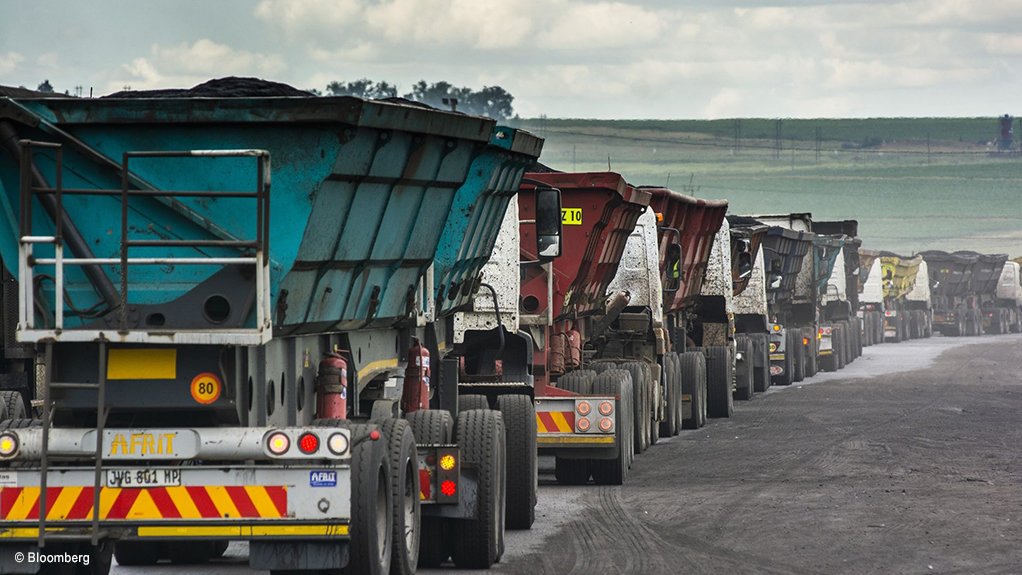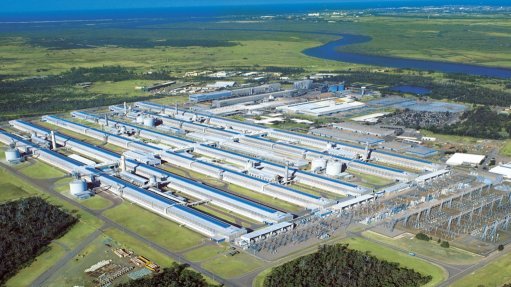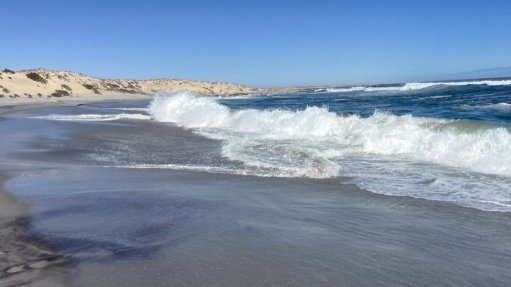Global demand for coal is bringing mayhem to South African towns
An often impenetrable logjam of trucks laden with coal at South Africa’s crossing with Mozambique has brought chaos to a sleepy border town.
Elephants escaping from the nearby Kruger National Park often caused the biggest commotion in Komatipoort. These days residents check their CCTV cameras on their phones at barbecues on the weekend. The congestion created opportunities for criminals who saw drivers stranded in the queue for days on end as easy targets after nightfall. Robberies, theft and assaults spread from the highway to the town. Road accidents increased.
The trucks began trundling through in ever greater numbers on their way to Maputo port, where their cargos are loaded onto ships and sent around the world, after South Africa became one of Europe’s main alternatives to Russian coal following Moscow’s invasion of Ukraine in February 2022. The procession continues even though European fears of an energy crisis have faded for now. Suppliers are finding new buyers in India and China. And miners of chrome, used to manufacture stainless steel, are increasingly using the same routes.
“It’s worse than it’s ever been,” said Jan Engelbrecht, who heads Komatipoort’s business chamber, of the traffic, adding that he expects it to increase by more than 1,000 trucks a day to 3,000 a day by the end of 2024.
Residents want their quiet life back, and for companies including Glencore, Sasol, Thungela Resources and Exxaro Resources to move exports from pit to ports entirely by freight trains. That’s not possible. Like the majority of state-owned companies in Africa’s most industrialized nation, Transnet Freight Rail is crumbling. Volumes transported on its network have declined by nearly a third over the past five years because of issues that include poor management and idle locomotives, cable theft and aging tracks. Miners have no choice but to use trucks to cash in on record demand.
President Cyril Ramaphosa described the rail constraints as “a crisis of catastrophic proportions” in a meeting with key exporters in April and created a task force that includes private companies to look for solutions. They will take time to find, his spokesman said in response to questions in late July, adding “this is not a challenge you can resolve overnight.”
South Africa’s coal industry is the world’s fifth largest. In all, about 15 million tons of coal last year arrived at ports by road and another 50-million tons by train, earning its miners R227-billion after prices reached a record high of $450 per ton. That boosted South Africa’s economy – and for the first time, coal came close to rivalling platinum as the country’s most valuable export.
But the failures of Transnet resulted in lost opportunities. Shipping by road costs about 40% more. And if the rail network had been running at full capacity, the miners would exported more than R100-billion worth of minerals, according to the chief economist of Minerals Council of South Africa, Henk Langenhoven.
“It’s more costly and it affects the roads. It creates accidents. It’s bad for the country,” said Vuslat Bayoglu, managing director at coal miner Menar, of using trucks at a conference in July. Coal producers are funding security operations for the rail lines and are eager for private companies to be allowed to run their own trains.
Even South Africa’s trucking lobby group agrees coal should be transported in rail wagons, not on roads. “They were not designed for that,” said Gavin Kelly, chief executive officer of the Road Freight Association.
Trucks have another disadvantage: they produce three times more CO2 emissions than trains, according to calculations by Bloomberg.
Not far from the other main regional port, Richard’s Bay in South Africa, Pongola is also suffering. Once a small sugar-cane farming community where tourists would gather to spot lions in nature reserves, the town now resembles a giant truck stop. The excess traffic is ripping up roads. Drivers swerve to avoid the deepest potholes as they bundle over a mangled mess of tarmac.
A truck plowed into a pickup in the oncoming lane at the bottom of a surrounding hill last year, killing at least 20 people, mostly children – an accident that came to symbolize local anger with rising traffic. The truck was torched and residents began staging regular protests. “The mayor is still of the view that the community of Zululand is not safe,” said Zanele Mthethwa, spokesperson for the municipality said last month.
Six years ago, when Bertus Koekemoer, a private security company manager, moved to Komatipoort, he would sit on his porch and watch buffalo wallow in a river overlooking Kruger National Park. “It was heaven,” he said. This year, he helped secure the release of two drivers who had been kidnapped by a gang of criminals.
Common assaults almost tripled in the first quarter year-on-year in the town while thefts from vehicles doubled. Neels Pohl, who works for a local bus company, said in July that he was seeing more collisions a week than during his entire six-year career as a traffic officer in the area.
Tourism numbers, meanwhile, have dropped, especially for Mozambicans who would travel to South Africa for shopping or medical treatment, with their government last month warning them to only make the journey if urgent.
Nathi Mathebela said he was driving a minibus carrying 13 people, including Dutch tourists, in June when men armed with machetes, guns and hammers attacked them in a traffic jam, smashing the windows and taking all their possessions, even their shoes. After that, the minibus association, seeing a collapse in passenger numbers crossing the border, decided to send its own wardens to restore order.
Where before there were gnarled knots of vehicles stretching as far as the eye can see, is now a neat queue inching forward. Drivers who try to jump ahead are sent back by the wardens who police the congestion with sjamboks, long rubber whips.
Residents are relieved they can move freely once more. But tensions have flared between the wardens and truck drivers, who accuse them of smashing truck windows and deflating tires of vehicles suspected of jumping the queue, actions they deny.
If the government doesn’t find solutions soon, Engelbrecht, the business chamber head, said he fears “cut-throat” chaos is around the corner.
Article Enquiry
Email Article
Save Article
Feedback
To advertise email advertising@creamermedia.co.za or click here
Press Office
Announcements
What's On
Subscribe to improve your user experience...
Option 1 (equivalent of R125 a month):
Receive a weekly copy of Creamer Media's Engineering News & Mining Weekly magazine
(print copy for those in South Africa and e-magazine for those outside of South Africa)
Receive daily email newsletters
Access to full search results
Access archive of magazine back copies
Access to Projects in Progress
Access to ONE Research Report of your choice in PDF format
Option 2 (equivalent of R375 a month):
All benefits from Option 1
PLUS
Access to Creamer Media's Research Channel Africa for ALL Research Reports, in PDF format, on various industrial and mining sectors
including Electricity; Water; Energy Transition; Hydrogen; Roads, Rail and Ports; Coal; Gold; Platinum; Battery Metals; etc.
Already a subscriber?
Forgotten your password?
Receive weekly copy of Creamer Media's Engineering News & Mining Weekly magazine (print copy for those in South Africa and e-magazine for those outside of South Africa)
➕
Recieve daily email newsletters
➕
Access to full search results
➕
Access archive of magazine back copies
➕
Access to Projects in Progress
➕
Access to ONE Research Report of your choice in PDF format
RESEARCH CHANNEL AFRICA
R4500 (equivalent of R375 a month)
SUBSCRIBEAll benefits from Option 1
➕
Access to Creamer Media's Research Channel Africa for ALL Research Reports on various industrial and mining sectors, in PDF format, including on:
Electricity
➕
Water
➕
Energy Transition
➕
Hydrogen
➕
Roads, Rail and Ports
➕
Coal
➕
Gold
➕
Platinum
➕
Battery Metals
➕
etc.
Receive all benefits from Option 1 or Option 2 delivered to numerous people at your company
➕
Multiple User names and Passwords for simultaneous log-ins
➕
Intranet integration access to all in your organisation





















